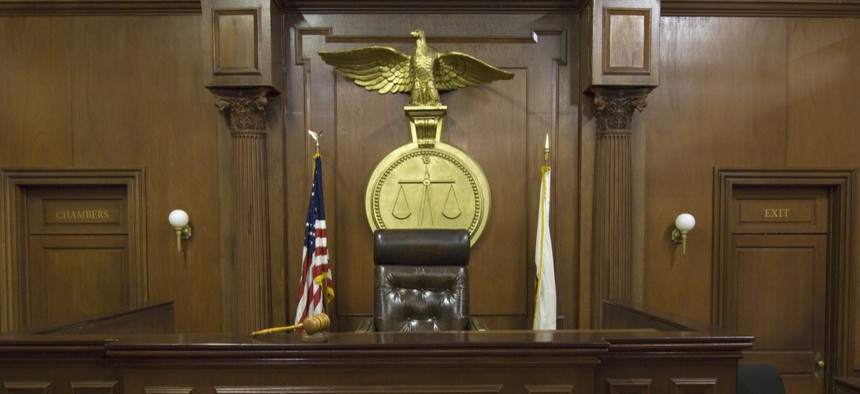Plea Bargaining Needs to be More Transparent, Report Argues

Plea deals are widespread throughout the criminal justice system. Shutterstock
Widespread plea bargaining in the criminal justice system may be fueling racial inequities and leading innocent people to plead guilty, says a new report from the Vera Institute of Justice.
Around 9 out of 10 convictions obtained in large urban state courts were the result of plea deals worked out between prosecutors and defendants, a new report from the Vera Institute of Justice found.
More broadly, in the years studied, researchers found that 97% of all convictions in these state courts and 90% in federal court came about through defendants pleading guilty.
The high number of criminal cases that are resolved by plea deals is a cause for concern among criminal justice reform advocates, who say that the process is too unregulated and informal. The lack of transparency in the system could be contributing to racial inequities and leading innocent people to plead guilty, they argue.
“I was actually very surprised by these findings,” said Léon Digard, senior research editor at the Vera Institute. “The fact that the vast majority of cases are resolved through pleas means that they are essentially a core pillar of the criminal justice system, but the process is almost entirely hidden.”
The report looks at the scope of research on plea bargaining in years where data is available, including 2009 and 2014, and draws conclusions from several empirical studies. But even tapping that body of research, studying plea bargains can be difficult, Digard said, because deals sometimes are worked out between prosecutors and defense attorneys in courthouse hallways or the district attorney’s offices. The information discussed during these conversations often then isn’t collected in any centralized database.
When prosecutors offer deals, they usually dismiss one or more of a defendant’s charges in exchange for a guilty plea to a lesser offense. Sometimes plea deals include an agreement to a more lenient sentence or an omission of certain facts of the case on the record. Prosecutors say they rely on plea deals to move cases along quickly, emphasizing the criminal justice system would not be able to handle the caseload if every single case went to court. They also say that trials are expensive, so plea deals can save defendants and the state money.
But the report claims that plea deals can end up perpetuating systemic racial biases in the criminal justice system and fueling mass incarceration. Black defendants are almost 70% more likely than white defendants to receive a plea deal that includes incarceration, something that Digard said can be “destabilizing and traumatic” for Black communities.
The report also notes that plea deals can end up short circuiting due process and coercing innocent people into pleading guilty. Researchers found that if a person is detained in jail before their trial, they are 46% more likely to plead guilty, raising questions as to whether these defendants might be innocent and pleading guilty to be released from jail. The report points to Harris County, Texas, where a drug lab that continues to process evidence even after a guilty plea is lodged has found more than 140 felony and misdemeanor cases in which innocent people admitted in court to being guilty of drug possession because they wanted to be released from jail but could not afford bail.
“That county is unlike most others in the country because they continue to test substances after a case is over,” Digard said. “But it’s just one county in one state, so what is happening in the rest of the country? That’s one of the tragedies of all this. We’ll never know how many innocent people plead guilty in a coercive system.”
In recent years, many scholars have argued that the plea bargaining process should be nationally standardized and regulated to prevent coercion and ensure fairness for defendants.
Nancy Parr, the president of the National District Attorneys Association, said that while she agrees with the report’s conclusion that plea bargaining is a “complex, interactive dialogue involving multiple people and various considerations,” she does not think the process unfairly disadvantages defendants or coerces them into pleading guilty.
“I describe plea agreements as the result of negotiations between informed counsel after taking into consideration the specific facts of the case,” she said. “Before a guilty plea is accepted by a court …the defendant is asked if the plea is voluntary and if he or she is satisfied with the representation by his or her attorney. Sometimes the plea hearing is stopped because the accused states that he or she is not satisfied with the representation and has had very little contact with his or her attorney.”
Parr noted that it is the job of defense attorneys to thoroughly advise their clients on “the ramifications of entering a guilty plea.”
Digard said that in order for the public to have greater confidence in the system of plea bargaining, there first needs to be more transparency, starting with consistent and standardized data about what circumstances warrant a plea bargain, how agreements are made, and what factors influence the eventual deal.
“It goes beyond just releasing data. It’s creating the data,” he said. “I don’t think prosecutors are sitting on data about plea deals and refusing to release it. Deals are happening quickly in corridors or they're not monitored. It’s become an opaque system. That needs to change.”
Emma Coleman is the assistant editor for Route Fifty.






